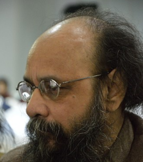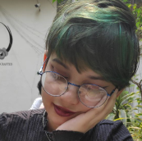Translated from the Bengali by Chirayata Chakrabarty
Nanda’s Ma
What land were we moving to?
What land were we moving from?
Over the rolling plains
a dew-drenched barbed wire, foliage
we crossed field borders
we crossed wheat fields
my sister and my parents, village folk
and next to them, me, Princess? Or Priyabala?
Ma-Pa call me Princess,
the school called me Priyabala,
merely into two or three classes
someone in the village cried,
“Run, all of you, run!”
We fled, the whole village with us
We fled, Ma, Pa and two sisters
through the thicket, through the rotting river
past the sleeping thatches
the slumbering fences, the gourds abed on top
the waggon wheel laid in the yard
the plough resting, the jasmine tree at the porch
the ghora-neem half hiding the moon.
We move soundlessly, yet the branches bend and
touch the brow, dew chilled heads, leaves like
wet and coarse palms
We have crossed so many fields
and now we rest under a tree,
with flattened and puffed rice, and jaggery
from each of our sacks…
Then our eyes close, tire-heavy.
Suddenly we see, scurrying people
how the villages burn,
Where are you, oh Precious? Oh, Princess, where are you two?
our parents call us by our pet names.
I remained, but
no one knew where Precious ended up,
removed from us
We crossed barbed wires
All of us, low necks, ducked heads
across the papers, the immigration papers
on the launch, then the train
on our way to somewhere
The longer we moved,
the more shreds our path tore into
Where is that country? In the past? In the future?
I have left some of my life back there
Princess, Princess — Priyabala, Priyabala
The names, dropped on the way and lost.
some fell in the wheat fields
some in the river flow, on the vacant banks
the school has robbed some of it
some are lost in the riots on the streets.
the tree below which we lay,
some of the name is over there
some of it was taken by the meadow dew
some went to the raiders…
Some got caught in the fence
some of it is tucked into the hay laths
some of it impaled by the wire barbs
some left in the immigration papers
One life I left back there
one life grabbed by my husband
one life drained into raising a son
Now I let them know of me by the son.
Now I’m surrounded by apartments
Now I’m surrounded by slums and slums of people
Houses of bamboo and wattles by the railroad
that working women emerge from.
I was a part-time maid,
now I get my daily supplies right here, at 5-C,
My son is married and gone,
and I spend right here,
summers, monsoons, winters…
I sit right here, Nanda’s mum,
not thinking of my son,
not of my husband,
only of us running,
running away to some other place.
And with us, the trees,
the moon, the trail of huts,
someone burned our home, and cried, “run” –
one after another, people, burning villages,
roofs, antennas,
the saucer moon above the roof
Who said saucer? Did you not know
how the one-eyed moon lit the flaming village?
No, nobody knows, they’ve forgotten, they forget
One after another, the buildings rise out of the ground
One after another, the cars dart deaf and dumb
The village-burnt ashes still linger in the air.
They stick to the walls, the windows, the door
Who dusts them with a dirt rag in hand?
Who goes to the market? Who brings the dinner plate?
Who survives all these days of sun, rain, storm, neglect?
The one who herself is a tree?
What tree? What tree? Tell me, you, apartments, big burnt moon,
tell me all of you, deaf and dumb
Is Nanda’s mum Princess, or Priyabala?
__
Translator's Note
When the people with trauma don’t have a voice, it is upon those who do to try and bridge the chasm between the present and the history. Going a little bit into the partition between India and Pakistan, a multitude of people had to run for their lives, leaving behind all that they knew to be theirs, their homes, neighbors and even family – a part of their lives – hunted by the danger of being killed, injured, raped, and the banality of evil. It is important for us not to forget the refugee experiences amassed at the time, to remember with as much sincerity as possible, and to note the generational trauma that has been since inherited. It is important to remember that trauma does not simply go away but is stored carefully and then passed down like heirloom.



























A much needed work done by a little girl.
My love and best wishes to her.
Excellent translation! This really keeps pace with the original. Please carry o!
Well done girl! Nice translation, really presented the real zeal of the poem.